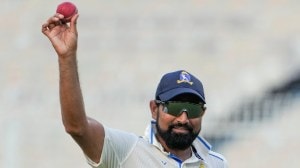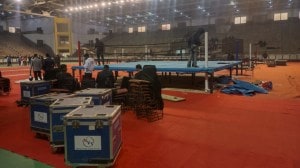The see-saw battle for CEDAW
FEBRUARY 12: As an international treaty, the Convention on the Elimination of All Forms of Discrimination Against Women CEDAW, is hardly...

FEBRUARY 12: As an international treaty, the Convention on the Elimination of All Forms of Discrimination Against Women CEDAW, is hardly known in this country. And its unwieldy acronym hasn8217;t helped. Yet, for women, it is one of the most important and useful pieces of international legislation. It has been around for over 20 years with no less than 165 nations having ratified it India did so in 1993. And although the actual status of the women in these 165 countries may range from the indifferent to the totally marginalised, the treaty represents a valuable international consensus that the human rights of women constitute an ideal worth striving for.
Indian courts have officially recognised the significance of the Convention. In its path-breaking judgement, Vishaka and the State of Rajasthan, which viewed for the first time in the history of the country sexual harassment as a violation of human rights, the Supreme Court stated that international conventions were significant 8220;in the absence of domestic law occupying the field, to formulate effective measures to check the evil of sexual harassment of working women at all work places8221;.
Any international convention, the judges stated, that was not inconsistent with the spirit and provisions of the Constitution, must be read into existing law so as to enlarge its meaning and content.
So what is CEDAW all about? Let8217;s put it this way. Every nation that has ratified the Convention agrees to pursue a policy of elimination of discrimination against women. Discrimination, under CEDAW, is defined in a substantive fashion: it is 8220;any distinction, exclusion or restriction made on the basis of sex which has the effect or purpose of impairing or nullifying the recognition, enjoyment or exercise by women, irrespective of their marital status, on a basis of equality of men and women, of human rights and fundamental freedoms in the political, economic, social and cultural, civil, or any other field.8221;
Once governments ratify the Convention, they are required to report every four years to the specially constituted CEDAW committee on how far they have progressed in achieving this.
Women in various countries have worked long and hard to ensure that this international treaty is better comprehended. Says Setsuko Ishizaki, of the Tokyo-based Japanese Association of International Women8217;s Rights, 8220;International law is difficult to understand so we have taken to drawing posters highlighting the CEDAW provisions.8221;
Last month saw the Indian government present its initial report to the committee at the UN headquarters in New York, along with seven countries, including Myanmar and Congo, which are not exactly known for its human rights, let along women8217;s rights, record.
8220;Many countries view this as a public relations exercise. But it is not one,8221; observes Shanthi Dairiam, director of the Kuala Lumpur-based International Women8217;s Rights Action Watch Asia-Pacific, who has been studying the CEDAW process for over 10 years. 8220;It is a process of dialogue. The CEDAW Committee8217;s purpose is not just to be critical of individual governments, but to work with them to find suitable solutions. And governments everywhere are beginning to feel the pressure.8221;
She believes that it is important that governments are honest about the process. Savitri Goonesekere, a vice-chancellor in Sri Lanka, and a member of the CEDAW Committee, speaking to The Indian Express, underlines this.8220;There is really no point in misrepresenting facts to the Committee.Governments should know that the world is shrinking and that news travels very fast and very effectively.8221;
Myanmar discovered this to its cost. No sooner had its permanent representative to the UN, U Win Mra, made his presentation along with his colleagues, claiming among other things that in Myanmar women enjoy equal rights in respect of the right to vote and right to be elected, the Committee wanted to know about a woman called Aung San Suu Kyi whose right to be elected was so rudely curtailed.
Jordan was questioned at length on its laws that prohibit a victim of rape, even incestuous rape, from seeking an abortion. In the Congo, the targetting of women civilians by the security forces and oppressive customary laws that view women as the property of men came in for special scrutiny.
India, too, was not spared. Many of the interlocutors displayed an easy familiarity with the Indian experience and, at one point, Savitri Goonesekere, who happened to be the rapporteur for India, wanted to know why, despite the Supreme Court ruling that eight years of schooling is a fundamental right, India has still not made education compulsory in the country. Former Bangladesh bureaucrat, Salma Khan, another committee member, after observing that the caste system is perhaps the world8217;s largest surviving social hierarchy, wanted to know why Dalit women continued to suffer social ostracism despite progressive laws and affirmative action.
But it was the lack of reform in personal law that came in for the sharpest comment since India, even while ratifying CEDAW, had expressed its inability to register marriages or reform the personal law of minority communities unless the demand for change came from within them. For the Committee, registration of marriage was seen as vital if women were to claim their rights within marriage. It also wanted to know if there were any attempts to talk to religious and community leaders to convince them of the need for reform and whether India was going to be influenced by the important changes in family laws instituted in Islamic countries like Bangladesh and Pakistan.
Activists, representing over 65 women8217;s groups in India, who had participated in the CEDAW session, are anxious to hasten the pace of personal law reform. They argued that the State can at least begin by amending Hindu Personal Laws, which although it was partially reformed in the 8217;50s, is still far from equal. Even a so-called secular law, like the Special Marriage Act, needs reform, they argued.
Women hope that by the time India submits its next report to the CEDAW committee, four years from now, it would have done something substantial towards achieving this. As one woman put it, 8220;The India government, in its presentation to CEDAW, has made so many promises. We want a timeframe within which these programmes are to be implemented. We need to know more specifically, the extent of violence against women and the legal regulation of it. We need to know the amount and percentage allocated towards women8217;s development in all sectors of the economy. We want draconian laws that seriously affect the lives of women living in conflict situations to be repealed.8221;
The wish list that the CEDAW process has unleashed is really unending. But for the Convention to actually fulfil its stated purpose, there must be greater awareness of its provisions. Both ordinary women, inhabiting a world quite removed from the topless towers of New York, and those who run the government or preside over the courts, must understand the significance of this historic treaty.
- 01
- 02
- 03
- 04
- 05






























